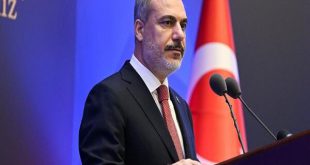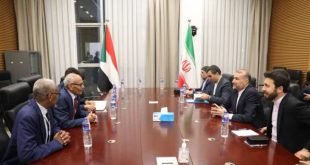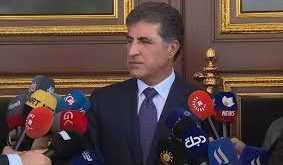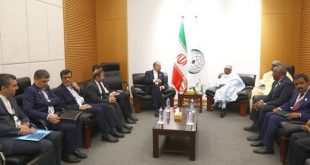by Zahra Asadian : “I think 2001 was the year of ‘Dialogue among Civilizations’ when the United Nations accepted Iran’s proposal for dialogue. We need dialogue between Muslims and Christians because Muslims and Christians make up half of the world’s population. Such constructive dialogue would unite half of the planet, and it is a good thing, but it has yet to reach its goal. Fortunately, we have social media that can make dialogue easy. So, we should not be lazy, and we will witness this renaissance in the future. There are good voices of humanity, good voices of morality, and good voices of peace and justice, but we need to employ them and have a vision,” said the Imam of the Islamic House of Wisdom in Dearborn Heights, Michigan.
Imam Mohammad Ali Elahi is the founding Imam of the Islamic House of Wisdom in Dearborn Heights, Michigan, USA. In an interview with .. English, Imam Elahi talks about Shia Islam in Dearborn and the concerns of Muslims in the United States.
..: Please introduce the Islamic House of Wisdom and its activities.
Imam Elahi: The Islamic House of Wisdom is one of the prominent mosques in Michigan, and the leader in interfaith dialogue. Established in 1995, our mission can be summed up in six words: Faith, education, love, justice, outreach, and action. We are an Ithna Ash’ari Shia Muslim organization. Imam Ali (A.S) is the voice of unity, and he said: “People are two categories: Either brothers in faith or equals in humanity,” and we genuinely believe in that. Fostering brotherhood, creating a community, making relationships and coalitions produce allies based on trust and responsibility.
From our point of view, we consider Shiism to be the following of Ahlul-Bayt (AS), which means commitment and responsibility. So, when we live in a wild world that suffers from natural disasters, hunger, disease, war, and terrorism, we feel that the Shia community should be part of the solution, assisting the needy and the victims and highlighting the plight of the unfortunate. Recently, several tragic events have happened worldwide, and only the earthquake in Afghanistan was briefly reported in the news. Three thousand people were killed or wounded in one day. It was announced in the news one time and then forgotten. And nobody cares about them, not even their government. So, we think that while we live in America, the land of opportunity, there is a chance for us to help as individuals or as organizations, as part of our commitment to justice and peace that our beloved Prophet Mohamad (PBUH) preached.
“Since 1912 and before that, there were Shia Muslims in Michigan”
..: It is known that a large number of American Shia Muslims live in Dearborn. Tell us about the history of Islam in Michigan and the life of Muslims in Dearborn.
Imam Elahi: Muslims, especially Shiism, has been part of Michigan for over a hundred years. Immigrants from Syria and Lebanon began settling in the state in early 1900. Fatemeh Mosalmani was one of the passengers on the Titanic. As you know, the Titanic sank in 1912, and she miraculously survived. She was from Tebnin in Southern Lebanon. Her two cousins, Mustafa and Yusuf, died on the Titanic along with possibly 1,500 others, but Fatemeh survived and lived in Dearborn until she died in 1973. So, I would say that since 1912 and before that, there were Shias and Muslims in the Dearborn area.
Imam Khalil Bazzi laid the foundation for religious work in the Dearborn area, followed by Imam Mohamad Jawad Chirri, both of Lebanon, who took over in 1946. He went to Egypt in 1959 and met with the late President Gamal Abdel Nasser, seeking his help to establish the first Islamic center in Michigan. Nasser gave Imam Cheri $40,000 at that time, and he found the Islamic Center of America on Joy Road in Detroit in 1963. I became the director of that center when I came to Michigan in 1992 before establishing the Islamic House of Wisdom in 1995. Today, nearly half of the residents in Dearborn Heights are Shia Muslims. The mayors of both cities, the Mayor of Dearborn and the Mayor of Dearborn Heights, and the Dearborn Police Chief are all Muslim Shias of Lebanese origin.
“American Religious communities worried about assimilation of their members to the secular culture”
..: What special issues and problems do American Muslims face?
Imam Elahi: America is a melting pot, and all immigrants to the United States face challenges preserving their culture and way of life, and American Muslims are no different. Fortunately, America provides its citizens the freedom to worship and express themselves as they wish.
We advise people to have an interpretation, that is, to assimilate into the American society while maintaining their religious and cultural identity and values, following the teaching of Imam Al Sadiq (A.S), who says: “Be an invitation and promote with your actions before your words”.
We also provide Arabic classes, programs, and activities to teach Arabic, teach Islamic studies and encourage the community to maintain and preserve their culture and identity. Some immigrants face difficulties assimilating, including the breakup of families, the culture of boyfriends and girlfriends instead of marriage, and same-sex marriages, which is called a civil union here, all of which contribute to the break up of the family. The number of divorces in some American cities is frightening. Now I am speaking in general and not just about Muslims. There are states where we hear about 70% of marriages falling apart, including all religions and communities. Although our resources are limited, we provide marriage counseling and programs to strengthen the community and help address some of the challenges.
“One of the problems is that many times people do not talk to each other”
..: What are your activities in the field of interfaith relations?
Imam Elahi: Imam Ali (AS) said: “Ignorance makes the living dead and prolongs the misery.” He also said: “Our enemy is our ignorance.” Therefore, we try to be the voice of unity in this area. For example, when Iraq experienced sectarian tensions in 2007, we invited Sunni Imams to the Islamic House of Wisdom and created a code of honor. As a result, approximately 30 Shia and Sunni Imams signed the honor code to promote respect, unity, and understanding.
One of the problems is that we do not talk to each other regardless of faith or denomination, fostering prejudice and ignorance. Therefore, we try to follow and promote what Shiism is about in the hadiths and the teaching of Ahl Albeit. A real Shia is a person who is generous, loving, a person of outreach, peaceful, balanced, and a blessing to his neighbors. These are the true qualities of a Muslim and a Shia, where a person should be righteous, humble, compassionate, and valuable to humanity.
We also hold programs to acquaint the general public with Islam and the Middle Easter culture. For example, the Islamic House of Wisdom has several programs every year, inviting priests, rabbis, elected officials, and the public to interact with the community and mitigate cultural differences.
Imam Mohammad Ali Elahi
..: What is your solution for interfaith dialogue in a wider space like the media?
Imam Elahi: We maintain a good relationship with the local and the national media, and we try to be as readily available to provide commentary on developing stories. We live in a country that includes different religions, such as Islam, Christianity, Judaism, and other denominations within these religions as well. Visit our website for more information on our media activities.
We also honestly believe that dialogue is the only way to mitigate those differences and inform each other and the general public because each religion or denomination has its own sets of beliefs and realities.
The absence of dialogue and widespread social media have fostered misinformation and an atmosphere of ignorance and bias. We try to provide reliable information about the Shia belief system to clarify misunderstandings.
“In the absence of dialogue, there is war”
..: From your point of view, what are the roots of Islamophobia in the United States? What tangible social and political consequences has it created in American society? What changes will these conditions have in the future?
Imam Elahi: America is a country of immigrants; all groups have encountered challenges and discrimination, and Muslims are no different. However, after the September 11 attack in 2001, Muslims began facing stereotypes from the Media and hostility from pro-Israel groups and right-wing Christian organizations. In addition, the sporadic attacks by some Muslim fanatics against the West, helped these groups to intensify their attacks on Muslims, Islamic teaching, Muslim groups, and religious institutions. But the ongoing work of good Muslims in the West fostered a host of defenders of Muslims, especially among the intellectual.
For example, Karen Armstrong, a British author who wrote “Muhammad: A Prophet for Our Time,” says that Islam is a religion of success, and Muhammad [PBUH] is a stunning success, politically and spiritually. Likewise, Michael Hart of New York, who wrote “The 100: A Ranking of the Most Influential People in History,” placed the Prophet Muhammad [PBUH] at the top of the list and Jesus third. So don’t be surprised, he says, because Muhammad was the most successful leader in history, both secularly and spiritually.
Even George W. Bush, the man who invaded Iraq and 9/11 happened during his time, said after 9/11 that Islam brings hope and comfort to millions of people in the United States and more than a billion people all around the World. Islam created a civilization rich in science and benefited humanity.
Jimmy Carter also said that Muslims and we have deep faith in a supreme being. We share the values of compassion, justice, responsibility, family, hospitality, and generosity. So we should appreciate Islam. The problem with politicians is that they say all these things, but when they go to their place, they forget that they talked about opportunities, security, honor, and respect, honor, all these things.
Some have argued that violence from some Muslims is the product of the West. Richard Labévière wrote a book called “Dollars for Terror” 20 years ago. In this book, he describes how Saudi dollars, the Mossad, the CIA, and all these organizations are behind all the so-called Islamic terrorism. Still, the point is that at least we can talk, agree, disagree, and sometimes get angry with each other, but at the same time, we continue this dialogue, which is the solution. I remember Mr. Khatami, the former president of the Islamic Republic of Iran at the time, proposed the idea of ”Dialogue Among Civilizations” to the United Nations and said that there is war in the absence of dialogue. I mean, we have only two options, either talk or destroy each other.
While western media focused on Muslims and tried to paint them as extremists, right-wing extremist groups emerged as a very dangerous force, threatening the democratic values that define America. They struck at the heart of America several times, including the attack on the U.S. Congress on January 6, 2021, when former president Donald Trump’s supporters stormed the capitol building to change the results of the elections.
This month, a jury convicted two Michigan men who allegedly plotted to kidnap the Michigan governor.
Even the media began taking notice today, calling these groups terrorists. In the past, if a crazy person who was a Muslim carried out a criminal act, the media immediately classified it as terrorism. They began implicating Islam and Muslims in America. At the same time, thousands of heinous crimes are committed by non-Muslims, such as school shootings and mass shootings, and the media reports them as incidents or as sick people who committed a crime and do not mention their religion. It is a double standard the media has been practicing, and Muslims must learn to find ways to influence the media and change that perception.
..: What future do you foresee for the American Muslim community?
Imam Elahi: Noam Chomsky says: “If you assume that there is no hope, you guarantee that there will be no hope. Therefore, you cannot lose your optimism. Optimism is a strategy for building a better future because if you believe the future will improve, you’re more likely to step up and take responsibility for building it. Whoever controls the media controls public opinion. If you’re teaching today what you were teaching five years ago, either the field is dead, or you are. Because everything is changing every day.”
So we must adapt and change our message and tools for advocating for Islam. Albert Einstein said that the definition of stupidity is repeating the same thing and expecting different results because people don’t want to learn from history. We are confident that we will get there as a community if we continue working. Today, we have lawyers, judges, doctors, mayors, school board trustees, house of representatives at the state level and congresspeople. The list is growing every day as new generations develop.
The American civil rights icon, Martin Luther King, said in his speech the night before he died on April 3, 1968, “I may not get there with you, but I want you to know that tonight will get to that promised land.” So, he always gave hope to people, even one night before his death. We have hope that we will prevail and be a vibrant community in America.
“Good voices of peace and justice are working, but we need to work on it more and have a vision”
..: How is it possible to make a better future for American Muslims?
Imam Elahi: Thinking about this question, verse 13:11 comes to my mind: “Allah does not change what is in a community unless they change what is in themselves.” So if you want to change your destination, you must change your dialogue and mind because man is a mind. I mentioned hope because it is essential to be hopeful in the first place, especially for Shia Muslims. We have a philosophy of Mahdism, which is the hope that one day there will be no oppression and injustice and that the righteous will rule the world.
So, we must focus on good ideas, and one of the things that Chomsky said was, “No one puts the truth in your brain. It is something you have to discover for yourself.” And the Quran also says: “And there is not for man except that [good] for which he strives.” So you are your mind, and you are your action. That is what we do at the Islamic House of Wisdom. We are about actions; we are about outreach, and we are about thinking critically and being mindful and thoughtful. So if we proceed wisely with these principles that the Quran says with actions, outreach, and dialogue, we will be successful.
“I am very optimistic and hopeful about the future of Muslims in the USA”
It is also about collaboration. Islam and Christianity have so many similarities. Jesus (AS) and his mother, Mary, are mentioned in the Holy Quran 70 times, and there are so many similarities in values between Christianity and Islam. We need to build on the common elements and learn to work together. We must also reach out to Christians as often as possible to establish strong ties and minimize misunderstandings.
We are a minority, and we don’t have many Imams here; we don’t have a seminary school in the United States to train Imams born in America. We have some Imams from the Middle East, many of whom do not speak English. But I see something positive, like a renaissance in the new generation and the youth.
They are aware that they are getting involved; if this continues, I am very optimistic and hopeful about the future. At the same time, we are vigilant and aware of white supremacy and extremists in the United States. Therefore, we should work closely with the authorities to protect our communities.
For example, most Americans do not understand Islam and view Muslims from an ISIS and Al-Qaeda point of view because that is what they hear in the media. Some women, who wear hijabs, are sometimes apprehensive about traveling in some parts of the country, but when the hijab is explained correctly and within the frame of religious freedom and personal right, they find acceptance.
Based on some studies, the majority of Americans don’t understand Islam. People fear what they do not know and fall prey to hatred and bigotry. So, we must educate the larger American community about Islam and our culture. America is a nation of immigrants and cannot survive without immigration. We need more dialogue and interaction with the rest of the country to mitigate ignorance and misinformation.
“We need the talks between Muslims and Christians”
..: In 2021, we witnessed the historic meeting of the Grand Ayatollah Sistani and Pope Francis, as an example of interfaith dialogue between the world’s leading religious leaders. How do you assess the impact of this meeting on strengthening peace, mutual understanding and interfaith relations?
Imam Elahi: First of all, the Pope, who could barely walk and used a wheelchair, walked through the alleys of Najaf to reach the house of Grand Ayatollah Sistani. And what he said after that meeting was terrific. He noted that Grand Ayatollah Sistani was a man of God and wisdom and that he was honored to meet with him.
The Pope recognized that Ayatollah Sistani doesn’t receive politicians, but he welcomed him for talks. I think it was a very historic meeting. The fact that the Pope met with Ayatollah Sistani was a significant step toward interfaith, and we hope these meetings continue.
2001 was the year of dialogue among civilizations when the United Nations accepted Mr. Khatami’s proposal for discussion. Iran started it, President Rouhani met with the Pope, and the Pope received him with great respect at the Vatican. However, we need more talks between Muslims and Christians, especially since Muslims and Christians make up half of the world’s population.
We should also utilize social media to spread awareness, distribute good information about Islam, and foster more dialogue among the different faiths. We have confidence that the reasonable voices of humanity, the good voices of morality, and the rational voices of peace and justice are working, but we need to do more and have a vision.
.. America
www….com
This text is originally published on Aug 19, 2022 at 20:59 and updated on Aug 28, 2022.
Read more from ..:
Shia Studies Expert: It is a duty to introduce the importance of Imam Ali (AS) to humanity
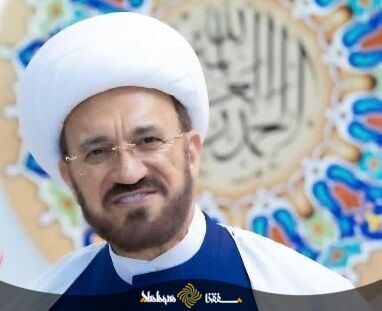
 صراط عشق صراط عشق
صراط عشق صراط عشق
